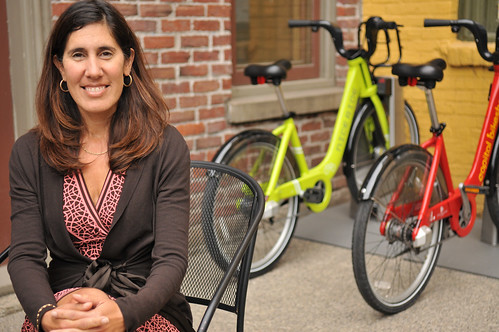
(Photos © J. Maus)
On the day her company won the contract to operate what will be by far the nation’s largest bike share system, Mia Birk held a small celebration in the courtyard behind her office in Southeast Portland. Birk, who’s tenacity and vision helped lay the foundation of Portland’s bikeway network in the 1990s (and became subject of her book), was beaming as she and colleagues took a moment to let the news sink in.
“So many cities are going into this like bike share is an extra, a fluff thing, but New York City is saying ‘no, this is a significant pillar of our transportation system’.”
— Mia Birk
As announced yesterday, Birk’s company, Alta Bicycle Share (which was founded three years ago as a spin-off of Alta Planning + Design, of which Birk is CEO) will partner with New York City’s Department of Transportation on a 10,000 bike, 600 kiosk system with an estimated price tag of $50-60 million.
The Alta Bicycle Share team spent six months on the winning proposal. Birk says the victory is a game-changer, not just for her Portland-based company, but for bike share and urban bicycling in general.
“It’s game-changing for our nation to have New York City jump into bike-sharing because it’s such a large city and they’re going to do it right and on a very large scale,” she shared with me during a chat yesterday. “So many cities are going into this like bike share is an extra, a fluff thing, but New York City is saying ‘no, this is a significant pillar of our transportation system’.”
Birk said the new system will be a vital “fourth leg” of New York City’s overcrowded transportation network that already consists of an excellent transit system, a burgeoning bike network, and sidewalks brimming with people on foot.
Bike share in New York City is expected to rack up one million rides in its first year, gobbling up the 22 percent of trips that are less than one mile and the 46 percent of trips that are three miles or less (stats which Birk rattled off without hesitation).
Birk sees the bike share decision by NYC DOT as just the latest sign that they are taking the bold steps necessary to make dramatic shifts in the car-centric status quo that plagues big American cities. “Just like they’ve done with cycle tracks, I think New York City has that kind of moxie, that kind of courage to say, we’re going to do it right, it’s going to be challenging, it will require some tradeoffs, but we’re there.”
As we spoke, Birk exuded her usual confidence and satisfaction that comes from a career built on doing big things in a field she loves; but there was also a sense that the unprecedented size and scope of the New York City contract will come with daunting responsibilities.
Birk estimates she’ll hire about 200 people in New York City alone just to handle daily operations of the system. That will more than double the 120 staff Alta Bicycle Share currently has spread across their other systems in Washington D.C., Melbourne, and Boston. (The Portland office houses the finance, software, planning, communications, and logistics staff.)
“It’s a huge challenge,” she shared, “Staffing up to that level in a city where there’s a lot of media attention, a lot of lawyers, a lot of humans, and a lot of politics… It’s clearly a very big risk and a big challenge.”
But, in a tone that many who have met Birk will recognize, she added, “But the exciting thing is, we’re up for it… We are determined to do everything we can to create a more bike and pedestrian friendly world and we’re willing to take risks to get there. We believe you have to take risks to be successful.”
For a sense of how the New York City contract changes Alta Bicycle Share, consider this. The company currently operates about 2,500 bikes and 220 stations across their three systems. New York City Bike Share’s 10,000 bikes and 600 stations will balloon those numbers and will make Alta the leading bike share company in North America (at this point they don’t really have any competition*). “It’s a big step up in our level of responsibility.”
For Birk, the silver lining is that Alta is growing quickly in an economy where good news is rare. “We’re trying to be a bright light in a dim economy. It’s a great moment in terms of our growth.”
Birk was referring to her company when she said “our growth,” but it’s not hard to see how the New York City project will set growth in motion in other ways as well.
(*B-cycle could qualify as Alta’s competition, but the two companies’ business models are different. B-cycle is focused on selling their bikes (made by Trek) and kiosks, while Alta is a full-service operator that provides bikes, kiosks, (which they purchase from Bixi in Montreal) and all the back-end services.)



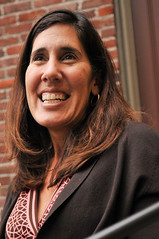
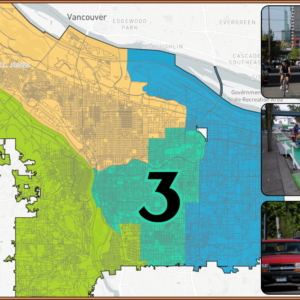
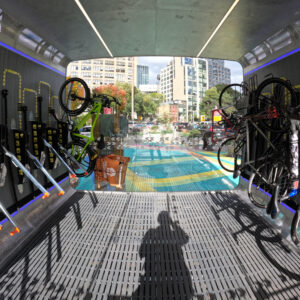
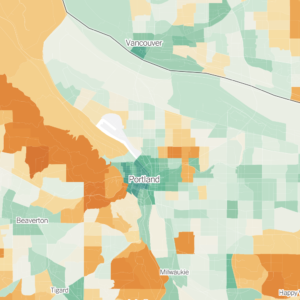
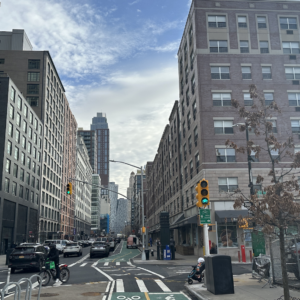
Thanks for reading.
BikePortland has served this community with independent community journalism since 2005. We rely on subscriptions from readers like you to survive. Your financial support is vital in keeping this valuable resource alive and well.
Please subscribe today to strengthen and expand our work.
Huge congratulations to Alta and New York!
It seems like the system would generate far more than one million rides in the first year. With 10,000 bikes in place, that’s about two rides per bike per week (10,000 * 2 * 52 = 1,040,000). Surely each bike will generate more than two rides per week, right?
The average CaBi bike in Washington DC is used for 5 trips per day.
10,000 * 5 * 365 = EIGHTEEN MILLION rides in a year. More like it!
Maus mentioned the other day that the NY system is expected to generate 27.5 million uses/year, so those figures are in the same ballpark.
That is… 1/4 Trimet’s annual ridership, by comparison.
(78 million in 2010)
not to ‘rain on the parade’ but thats a poor comparison, try comparing NYC bikeshare to NYC Transit which is 2 billion rides a year.
transportation demand isn’t be based on the number of available vehicles in a place. that’s backwards, like counting unsold cars to assess driving, or sneakers for walking. c’mon people, THINK about this.
“Generate” was the wrong word. I’m not a transportation professional. I suppose I mean “absorb,” or “carry.”
“How many additional bike rides will people go on as a result of bikeshare?” was the question I was trying to answer.
Reader alert: I’m all for bike share programs. Josh and Jessica were given the chance to post first to this article. It’s part of the good old girl-boy politics in Portland. It’s the reason Mia is silent about giving big money to Rex Burkholder. Silently promote a $5,000 million freeway project and you’re rewarded with city contracts. Jonathan is part of that network. Hey, it’s capitalism at it’s best. It’s why many former BTA staff are well off. Silence pays.
You’re definitely right. The system in DC just finished its first year with 995,000 rides, and only 1,100 bikes. I agree more with the 10 million number. I actually think it will be much higher than even that estimate, since NYC has WAY more tourists, way fewer car-owning households, way higher transit use, and a much denser plan for station spacing. In my opinion, DC stations weren’t spaced very densely, meaning that several times when I went there, I had to walk 5-10 minutes to get from the station to my destination. It looks like NYC is going to do it better, which will help ridership.
How much is it to ride?
When I was biking in Germany I had noticed their super rad bike sharing system. It allowed for the first hour(or Half hour) to be free and then the rate was per half hour or so…..If you had your credit card on file you could take the bike by swiping or calling and then you were on the clock. Making the first hour free will explode the use of these bikes and allow for quick access and return.
oops, i missed the article about costs, congrats!!!
Boston has 600 bikes, and in the first month has already has 36,000 rides. I normally take my own bike to work, but have used it probably 8 times already. Used it this morning because I have a cold, and didn’t feel up to the 6 mile ride, but was happy to ride the 1/2 mile from the subway.
Props to you for riding in Boston. I was just there this past week and decided to not try out the bike share system there after witnessing the chaos known as downtown drivers. I wanted to make it back to Portland alive. 😉
I second the contratulations! An amazing accomplishment. Good luck to Alta and Mia.
Boston doesn’t have 600 bikes yet. The launch was kind of a bad joke with one third of the stations not installed, some of which still aren’t, and not enough bikes. However, within three weeks there were enough bikes at all the installed stations and the remaining third are slowly getting installed. The system itself advertises itself and ridership has climbed as stations have come on line from both ends of desirable destinations. Alta repeatedly has had bumpy starts with its systems from not being prepared at launch, but in every case they’ve managed to catch up and the systems themselves seem to work well once underway.
Somehow I am not surprised, as they have to deal with local government (zoning, permit approval, etc).
Not to excuse late work, which is inexcusable in a contract.
Local government delays isn’t an excuse, they launched 1 year and 3 months later than planned.
As I said, in DC they did the exact same thing, took over a year to fill in what was supposed to be there on day one.
Nice.
“It’s game-changing for our nation…”
“We are determined to do everything we can to create a more bike and pedestrian friendly world and we’re willing to take risks to get there. We believe you have to take risks to be successful.”
Um… Mia for President.
Um, no.
Janette Sadik-Khan for mayor of NYC (eventhough I dont live in NYC). Its worth mentioning Anthony Weiner had wanted to run for NYC mayor and vowed to remove the bike lanes, I liked him before I heard that (as well as before he tweeted his junk).
will people be brave enough to rent a bike to try on NYC not so friendly streets?
Sadly, yes.
http://www.observer.com/2007/spokes-models
thanks for that link – that was a most amusing read.
Congrats to Alta, and nice picture !
Another win for Portland’s traded sector economy. Congrats Mia and everyone at Alta! Now is Portland going to get on this wagon at some point or be happy to bring up the rear.
I’m wondering about the more developed bike share systems like say, Washington DC, are they now cashing in on the success by pushing for more ambitious bike infrastructure now? Or are they still waiting and building up before doing this?
–
If I’m not mistaken this is one of the main yet less talked about objectives of bikeshare is to get the volume of bikes and new riders to justify better more extensive bike infrastructure… kind of a chicken and the egg situation… infrastructure then volume of riders, or in the case with bikeshare: volume of riders then infrastructure. (this being where bikeshare benefits the veteran cyclists less inclined to use a bikeshare system)
“one of the main yet less talked about objectives of bikeshare is to get the volume of bikes and new riders to justify better more extensive bike infrastructure”
You’ve hit the nail on the head…
I’m excited for Mia, Alta, NYC, and Portland!
Nice job Mia Birk and everyone else at Alta!!! You make us proud to be a Portlanders as most news articles about NYC Bikeshare made a big deal about Alta being from PDX.
I wonder if Alta plans on playing the same game they did in Boston
1) Submit highly attractive bid
2) Defeat competition, bask in media praise
3) Weeks later, behind the scenes, back away from many promises and refuse to sign contract, delay launch by a year while having a an exclusive brand new RFP written for them (as other companies have already lost and moved on)
4) Sign new contract with terms less favorable than what competition had originally offered.
5) Launch with continuous delays with a smaller system than originally promised, with higher prices and with more ads (sponsorships)
It’s the kind of business strategy that would make Mr Burns proud.
Just ask anyone familiar with the Boston process. Or how about DC? They promised x amount of stations, people signed up, and then a year later, 15 of those stations STILL hadn’t been installed. Youll note Boston is still at only 53 stations, well over a month after launch (they promised 61 after originally promising ~120)
Best of luck to NYC.
We’ll it’s easier to write how many stations will be some place and how long it *should* take. But when you get to the nitty gritty of where the city will let you put stations, what the businesses around it say and the logistics of supplies. There are often delays.
Im sure the MTA would write a fantastic proposal for NYC public transit, but the reality is things break, traffic happen, accidents happen, and people are diverted. Sometimes it really sucks. But. That is the reality of it, and they are trying best they can.
Basically, I don’t think anyone will hit your perfect expectations when it comes to shared transit modes. But at least they’re trying.
These remarks are 100% untrue. We stand by our work as a highly ethical and professional company driven by our mission to create active communities where bicycling and walking are safe, normal, healthy, and fun daily activiites. Come enjoy Cabi and Hubway with the thousands of other happy daily users!
Congrats to Mia & Alta!
That’s a huge system. Anyone have any stats about European systems? How does this compare to, say, Velib in Paris?
I was disappointed when the Portland system was announced with only 740 bikes. Now I’m REALLY disappointed. Hopefully our system will quickly expand in number of bikes and geographic area served.
Yes, congrats to Mia and Alta.
Mia has a long track record of bringing the dreams of bicyclists into reality.
May she be correct in this being the game changer. Bring on the future — who needs flying cars when you can just ride a bike — any bike, any city, anywhere?
Ted Buehler
Each ride will cost the vender about 25 cents. That’s laughably low compared to the heavily subsidized cost of every transit ride, which can run into several dollars per ride.
Apples to oranges. This system is explicitly targeting only the low hanging fruit — a small area with astonishing population density. Transit service in the same area generates an operating surplus; the entire NYC subway pulls in something like $1.08 in fares for every $1 in costs. It’s transit service out to the suburbs that loses money.
Congrats, this is a big win on many fronts.
Am I the only one that is scared of releasing thousands of new New York riders into the pot hole and taxi infested streets of NYC? I hope they have good insurance.
I think Alta really really needs to partner with the NYPD too. Traffic enforcement here is an absolute joke. If I had a commute to work where I didn’t see at least 5 cars double parked in bike lanes I would expect locusts and frogs. Seriously, the paint on the road here is for decoration, it doesn’t make people obey the rules. And so cyclists see this and dont obey the rules either.
Very proud of Mia and the people at Alta. What’s next.
How about a manufacturer of bikeshare bike systems in Portland. Anyone thinking about this? Portland has a growing sector in all areas of green design: transportation, energy, architecture, landscape. More manufacturing would be a great next step.
Thanks for all the kind words and encouragement! We are honored and excited to be a partner with NYC and pleased to be able to continue to fulfill our mission of creating active communities where bicycling and walking are safe, normal, healthy, and fun daily activities. Enjoy the ride!
Looking forward to bring one of those bikes back as a NYC souvenir in the belly of a Greyhound bus…I’ll have the shiniest bike in the Ozarks!
How many will be lost to theft, vandalism or a garbage truck taking out an entire rack of ’em? Is Alta financially able to pay for the losses? How about maintenance? Just my two cents…
Are they untrue?
Vendor selected for Boston area bike-sharing program
August 12, 2009 12:42 PM
http://www.boston.com/news/local/breaking_news/2009/08/vendor_selected.html
And yet Hubway didn’t launch until July 28 2011. After an embarrassing last minute 2 day delay.
1 year 11 months is quite the start-up time, and again, over 10% of the stations are yet to be installed.
I see in that article it states that the vendor was selected but that contracts still need to be finalized. It also never mentions Alta.
In this article
http://www.boston.com/lifestyle/health/articles/2011/04/21/boston_set_to_launch_bike_share_program/
It reads “At an afternoon ceremony with bicycling advocates, Mayor Thomas M. Menino is scheduled to sign a contract worth nearly $6 million with a company called Alta Bicycle Share”
That article was published on April 11, 2011. So from the time the agreement was signed until lauch it was less than 4 months.
Do you know why there are still uninstalled stations or why the launch was delayed 2 days? Do you know that it was Alta’s decision or fault? You seem to be laying blame without providing any background.
Jass,
You’re right, the article doesnt mention Alta, but most early media articles from any city (DC, NYC, Boston) confuse Bixi and Alta and their respective roles. Alta even had to issue a press release because people though they were having financial problems in Montreal, which they don’t run. This is also true for other companies that competed for the contract (Veolia, ClearChannel, B-cycle), the operator is rarely mentioned, just the manufacturer.
And yes, the contract wasn’t signed until 2011, because of the delays caused by the Alta/Bixi team.
I do hope the mistakes aren’t repeated in NYC, but I am unsure if the team that handled DC and Boston are ready for such a large deployment (and a less friendly media atmosphere, the WashPost and the B Globe were less critical than the Times, WSJ, and NY Post are)
Joe,
I think how these systems typically work now is by taking your credit card info so that a) if you use the bike longer than the free period you are charged the hourly rate and b) [I imagine] if you don’t return the bike, you pay quite a bit.